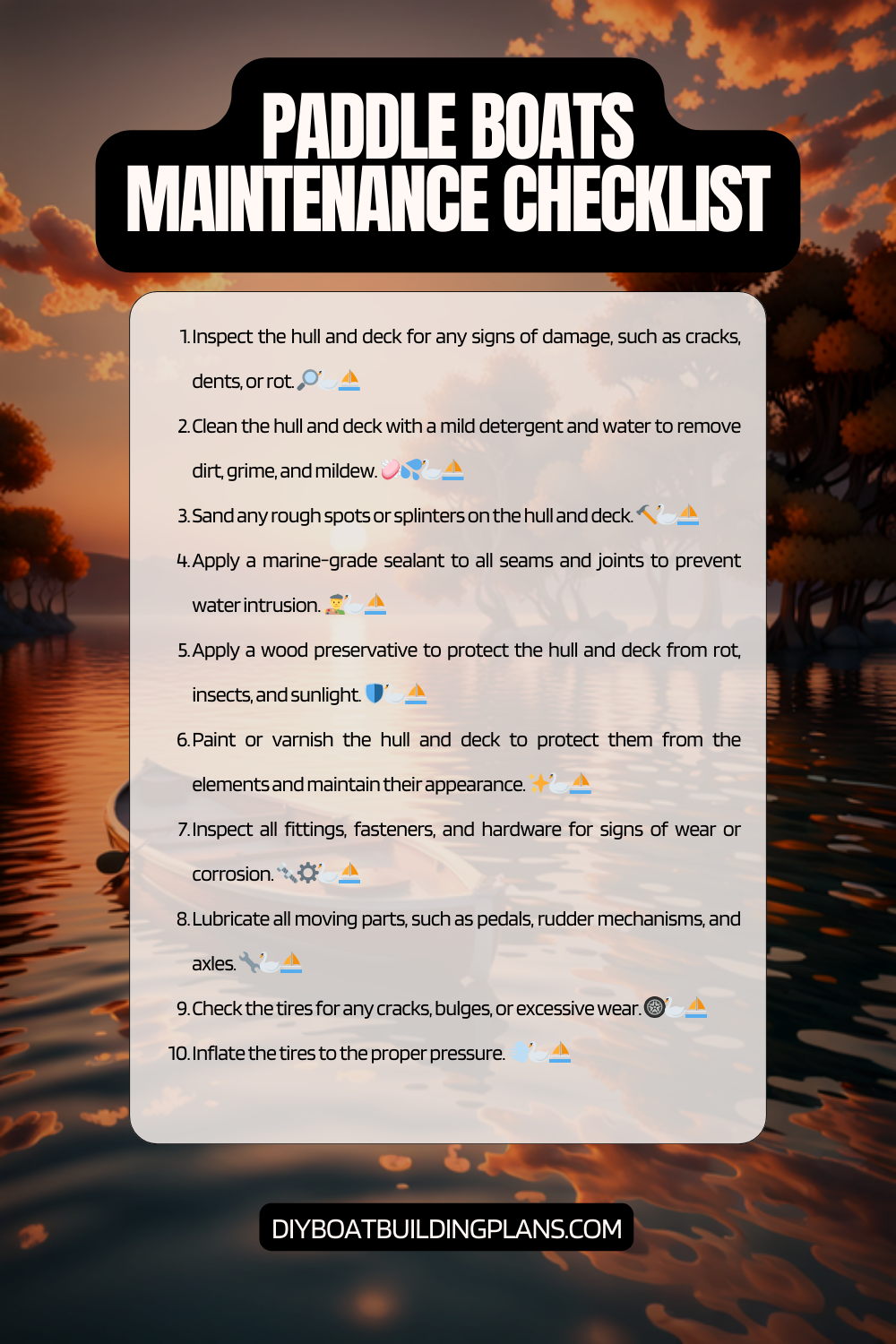Overview of Paddle Boat Maintenance Tips
Paddle boats have been a popular choice for recreational activities on the water for many years. These unique watercrafts are propelled by a paddle wheel, which is powered by the pedaling motion of the passengers. Paddle boats are commonly found in lakes, ponds, and calm rivers, providing a fun and leisurely way to explore the water. However, like any other vehicle or equipment, regular maintenance is crucial to ensure their longevity and safety.
Key Takeaways
- Regular maintenance is crucial for keeping your paddle boat in good condition.
- Cleaning and washing the boat regularly can prevent damage and prolong its lifespan.
- Checking the hull and deck for damage is important to ensure safety while on the water.
- Lubricating the paddle wheel and bearings can improve performance and prevent wear and tear.
- Proper storage and troubleshooting common issues can also help maintain your paddle boat.

Importance of Regular Maintenance
Regular maintenance is essential for keeping paddle boats in optimal condition. By performing routine maintenance tasks, you can prevent potential issues from arising and extend the lifespan of your paddle boat. One of the key benefits of regular maintenance is that it helps identify and address minor problems before they escalate into major ones. This proactive approach can save you time, money, and frustration in the long run.
Neglecting maintenance, on the other hand, can have serious consequences. Over time, dirt, debris, and algae can accumulate on the hull and deck of the paddle boat, affecting its performance and stability. Failure to clean and wash the paddle boat regularly can lead to corrosion and damage to the structure. Additionally, neglecting to inspect and repair any damage can compromise the safety of passengers and increase the risk of accidents on the water.
Cleaning and Washing the Paddle Boat
To properly clean and wash a paddle boat, follow these steps:
1. Start by removing any loose items from the boat, such as cushions or personal belongings.
2. Rinse the boat with fresh water to remove any loose dirt or debris.
3. Use a mild detergent or boat cleaner to scrub the hull and deck with a soft brush or sponge.
4. Pay special attention to areas with stubborn stains or buildup.
5. Rinse off the cleaning solution thoroughly with fresh water.
6. Dry the paddle boat with a clean towel or allow it to air dry completely.
Regular cleaning and washing of the paddle boat not only improves its appearance but also prevents the buildup of dirt, algae, and other contaminants that can damage the boat’s structure over time. It is especially important to remove any debris or buildup from the paddle wheel area, as this can affect its performance and efficiency.
Checking the Hull and Deck for Damage
| Item | Description | Measurement |
|---|---|---|
| Hull Damage | Visible cracks or holes in the hull | Number of damages found |
| Deck Damage | Visible cracks or holes in the deck | Number of damages found |
| Severity | How severe is the damage | Low, Medium, High |
| Location | Where is the damage located | Port, Starboard, Bow, Stern |
| Repair Needed | Does the damage require repair | Yes or No |
Inspecting the hull and deck of the paddle boat for damage is crucial to ensure its structural integrity. Look for signs of cracks, dents, or any other visible damage. Pay attention to areas that are prone to impact, such as the bow and stern. If you notice any damage, it is important to address it promptly to prevent further deterioration.
To repair any damage found on the hull or deck, follow these steps:
1. Clean the damaged area thoroughly to remove any dirt or debris.
2. Depending on the severity of the damage, you may need to sand down the affected area to create a smooth surface.
3. Apply a marine-grade epoxy or fiberglass repair kit according to the manufacturer’s instructions.
4. Allow the repair material to cure completely before sanding it down and applying a protective coating or paint.
By regularly inspecting and repairing any damage to the hull and deck, you can ensure that your paddle boat remains safe and structurally sound.
Lubricating the Paddle Wheel and Bearings
Proper lubrication of the paddle wheel and bearings is essential for smooth operation and longevity. Lubrication reduces friction between moving parts, preventing wear and tear. It also helps protect against rust and corrosion in wet environments.
When lubricating the paddle wheel and bearings, consider using a marine-grade grease or lubricant specifically designed for watercraft applications. Follow these steps:
1. Start by cleaning any dirt or debris from the paddle wheel and bearings.
2. Apply a small amount of lubricant to each bearing, ensuring even coverage.
3. Rotate the paddle wheel manually to distribute the lubricant evenly.
4. Wipe off any excess lubricant with a clean cloth.
Regular lubrication of the paddle wheel and bearings will help maintain their performance and extend their lifespan.
Inspecting and Replacing the Paddle Blades
The paddle blades are an integral part of the paddle wheel, responsible for propelling the boat forward. Regular inspection of the paddle blades is necessary to ensure they are in good condition and functioning properly.
Inspect the paddle blades for signs of wear and tear, such as cracks, chips, or bent edges. If you notice any damage, it is important to replace the paddle blades promptly to maintain optimal performance. Replacement paddle blades can be purchased from boat supply stores or online retailers.
To replace the paddle blades, follow these steps:
1. Remove the damaged paddle blades by unscrewing them from the paddle wheel.
2. Clean the paddle wheel thoroughly to remove any dirt or debris.
3. Attach the new paddle blades to the paddle wheel, ensuring they are securely fastened.
4. Test the paddle boat in calm waters to ensure proper functionality.
Regular inspection and replacement of the paddle blades will help maintain the efficiency and performance of your paddle boat.
Checking the Electrical System and Battery
For paddle boats equipped with electrical systems, regular checks are necessary to ensure their proper functioning. Signs of issues with the electrical system may include flickering lights, a weak battery, or malfunctioning controls.
To troubleshoot and repair any issues with the electrical system, follow these steps:
1. Start by checking the battery voltage using a multimeter. If the voltage is low, recharge or replace the battery as needed.
2. Inspect all electrical connections for loose or corroded terminals. Clean and tighten any loose connections.
3. Check all fuses and replace any blown fuses.
4. Test all electrical components, such as lights and controls, to ensure they are functioning properly.
Regular checks and maintenance of the electrical system will help prevent unexpected failures and ensure a smooth and enjoyable experience on the water.
Maintaining the Steering and Control System
The steering and control system of a paddle boat is responsible for maneuvering and controlling the direction of the boat. Regular maintenance of this system is crucial for safe and efficient operation.
To properly maintain the steering and control system, follow these steps:
1. Inspect all cables, pulleys, and connections for signs of wear or damage. Replace any worn or damaged components.
2. Lubricate all moving parts with a marine-grade lubricant to reduce friction and ensure smooth operation.
3. Test the steering and control system in calm waters to ensure proper functionality.
Regular maintenance of the steering and control system will help prevent issues such as stiff or unresponsive steering, ensuring a safe and enjoyable experience on the water.
Storing the Paddle Boat Properly
Proper storage is essential to protect your paddle boat during periods of non-use, such as during the winter months or when not in use for an extended period. Storing the paddle boat properly will help prevent damage from exposure to harsh weather conditions and prolong its lifespan.
To store your paddle boat properly, follow these steps:
1. Clean the paddle boat thoroughly, removing any dirt, debris, or algae.
2. Ensure the boat is completely dry before storing it to prevent mold or mildew growth.
3. Cover the paddle boat with a fitted cover or tarp to protect it from dust, UV rays, and other environmental factors.
4. Store the paddle boat in a dry, well-ventilated area away from direct sunlight and extreme temperatures.
During winter storage, it is important to take additional precautions to protect your paddle boat from freezing temperatures. If possible, store the boat indoors or in a climate-controlled storage facility. If storing outdoors, consider using a boat shrink wrap or additional insulation to protect against freezing.
Download over 500 Boat Plans. Click on the link below.
-->Click Here<--
Tips for Troubleshooting Common Issues
Despite regular maintenance, paddle boats may still encounter common issues. Here are some tips for troubleshooting and resolving these issues:
1. If the paddle wheel is not turning smoothly, check for any debris or obstructions that may be causing the problem. Remove any foreign objects and ensure the paddle wheel is properly lubricated.
2. If the paddle boat is experiencing steering difficulties, check the steering cables and connections for any signs of damage or wear. Adjust or replace any worn components as needed.
3. If the electrical system is malfunctioning, check all connections and fuses. Ensure the battery is fully charged and in good condition.
If you encounter more complex issues or are unsure how to resolve them, it is recommended to consult a professional boat technician for assistance.
Paddle Boat Maintenance Checklist

Conclusion – Paddle Boat Maintenance Tips
In conclusion, regular maintenance is crucial for ensuring the longevity and safety of paddle boats. By following the maintenance tips outlined in this article, you can keep your paddle boat in optimal condition and enjoy many years of safe and enjoyable experiences on the water.
Remember to clean and wash your paddle boat regularly to remove dirt, debris, and algae buildup. Inspect the hull and deck for damage, repairing any issues promptly. Lubricate the paddle wheel and bearings to reduce friction and prevent corrosion. Inspect and replace the paddle blades as needed to maintain optimal performance. Check the electrical system and battery regularly to prevent unexpected failures. Maintain the steering and control system for safe maneuverability. Store your paddle boat properly during periods of non-use, taking extra precautions during winter storage.
By prioritizing regular maintenance, you can ensure that your paddle boat remains in top condition, providing you with countless hours of fun and relaxation on the water.
FAQs – Paddle Boat Maintenance Tips
What is a paddle boat?
A paddle boat is a type of watercraft that is propelled by a paddle wheel. It is commonly used for recreational purposes such as boating and fishing.
Why is maintenance important for paddle boats?
Maintenance is important for paddle boats to ensure their safety, longevity, and optimal performance. Neglecting maintenance can lead to costly repairs and even accidents.
What are some basic paddle boat maintenance tips?
Some basic paddle boat maintenance tips include regularly cleaning the boat, checking for leaks, inspecting the paddle wheel, lubricating moving parts, and storing the boat properly.
How often should I clean my paddle boat?
It is recommended to clean your paddle boat after every use to prevent dirt and debris from accumulating and causing damage. A thorough cleaning should also be done at least once a month.
How can I check for leaks in my paddle boat?
To check for leaks in your paddle boat, fill it with water and observe if any water is leaking out. You can also inspect the boat for cracks or holes and repair them immediately.
What should I do if I notice damage to my paddle wheel?
If you notice damage to your paddle wheel, it is important to repair or replace it as soon as possible. A damaged paddle wheel can affect the performance of your boat and cause further damage.
What type of lubricant should I use for my paddle boat?
It is recommended to use a marine-grade lubricant for your paddle boat. This type of lubricant is designed to withstand the harsh marine environment and provide long-lasting protection.



